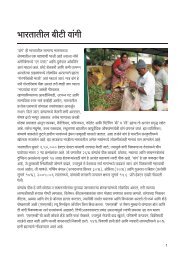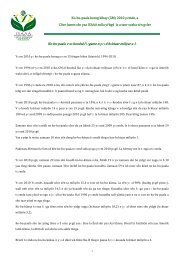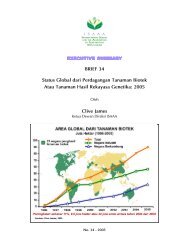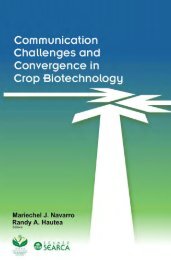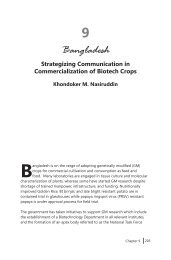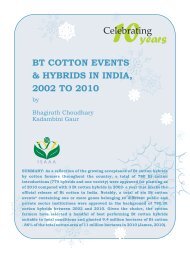Information Tug-of-War: Saga of Biotech Papaya 7 Agricultural - isaaa
Information Tug-of-War: Saga of Biotech Papaya 7 Agricultural - isaaa
Information Tug-of-War: Saga of Biotech Papaya 7 Agricultural - isaaa
Create successful ePaper yourself
Turn your PDF publications into a flip-book with our unique Google optimized e-Paper software.
<strong>Information</strong> <strong>Tug</strong>-<strong>of</strong>-<strong>War</strong>: <strong>Saga</strong> <strong>of</strong> <strong>Biotech</strong> <strong>Papaya</strong><br />
policy makers, and regulators for instance are needed to enhance<br />
knowledge and skills in communicating biotech effectively. More<br />
than skills, however, is the acceptance <strong>of</strong> a new role, that <strong>of</strong> a science<br />
communicator, possibly in tandem with research and administrative<br />
tasks.<br />
2. It took time for the science community and other science<br />
communicators to realize that a common voice <strong>of</strong> the science<br />
community and farmers, respectively, was needed to help legislators<br />
and decision makers understand the need for biotechnology and<br />
its benefits and risks. Except for a few farmer groups that joined<br />
anti-biotech campaigns, farmers were never prominent actors in<br />
the papaya debate despite the fact that they were the identified<br />
potential users/beneficiaries <strong>of</strong> the technology. Farmer leaders who<br />
have attended exchange visits to biotech growing areas outside <strong>of</strong><br />
Thailand have taken an active role in demanding the right to make<br />
decisions about technological innovations. The power <strong>of</strong> the science<br />
community in getting their messages across to legislators proves<br />
that collective action and commitment can move mountains (S.<br />
Sriwatanapongse, personal communication).<br />
3. The role <strong>of</strong> media and their ability to contribute to making public<br />
opinion about the technology is deemed important. Efforts have<br />
been made to link with the <strong>Agricultural</strong> Media Association whose<br />
president has already attended a workshop that included a visit to the<br />
Philippines to see biotech maize farms. Scientists have been invited<br />
for television and radio program interviews to increase coverage<br />
on the topic. Media may also benefit from technical updates from<br />
scientists and publications and in developing skills to deal with<br />
scientists (S. Sriwatanapongse, personal communication).<br />
4. The NGOs will continue to be a formidable force to contend with<br />
considering the cultural differences that discourage some groups<br />
from responding to their tactics. However, the bottom line is that<br />
science-based information is still the best ammunition and having<br />
activities that address the needs <strong>of</strong> consumers and end users<br />
(farmers) will enable stakeholders to critically assess the attributes<br />
<strong>of</strong> the technology and aid in their decision making. Nevertheless,<br />
it is important to note as Maeseele (2009) opines, that local NGOs<br />
are performing a role as alternative science communicators in the<br />
Chapter 7 175



